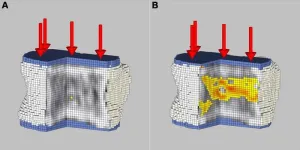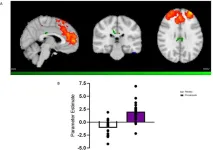(Press-News.org) PHILADELPHIA—The Pew Charitable Trusts today announced the 22 researchers selected to join the Pew Scholars Program in the Biomedical Sciences. These early-career scientists will receive four years of funding to spearhead innovative studies exploring human health and medicine.
“From vaccine development to treatments for complex diseases, biomedical research is foundational to solving some of the world’s greatest health challenges,” said Susan K. Urahn, Pew’s president and CEO. “Pew is thrilled to welcome this new class of researchers and support their efforts to advance scientific knowledge and improve human health.”
The 2023 class—all early-career, junior faculty—joins a rich legacy of the more than 1,000 scientists who have received awards from Pew since 1985. Current scholars have opportunities to meet annually with fellow Pew-funded scientists to exchange ideas and forge connections across a wide variety of disciplines.
“This new class of scholars embodies the creativity and curiosity that is key to scientific discovery,” said Craig C. Mello, Ph.D., a 1995 Pew scholar, 2006 Nobel laureate in physiology or medicine, and chair of the national advisory committee for the scholars program. “With support from Pew and its network of colleagues and advisors, I am confident this group will do great things to advance biomedical science.”
Scholars were chosen from 188 applicants nominated by leading academic institutions and researchers throughout the United States. This year’s class includes scientists who are studying how external and internal factors affect the gut microbiome, what causes HIV to re-emerge when treatment is halted, and how living an urban lifestyle affects long-term health.
Five members of the 2023 class, who were selected for their commitment to investigating health challenges relating to the brain as it ages, will receive awards with support from the Kathryn W. Davis Peace by Pieces Fund.
The 2023 Pew scholars in the biomedical sciences are:
Steven Banik, Ph.D.
Stanford University
Dr. Banik will harness cells’ natural ability to ingest materials from their environment to facilitate the delivery of proteins to sub-cellular compartments within the cell.
Christopher Barnes, Ph.D.
Stanford University
Dr. Barnes will develop vaccine candidates that spur neutralizing antibodies that cross-react broadly with multiple members of the coronavirus family, including SARS-CoV-2 and its known variants.
Ambre Bertholet, Ph.D.
University of California, Los Angeles
Dr. Bertholet will study how mitochondria, which produce cellular energy in the form of ATP, can instead be steered toward generating heat.
John Brooks, Ph.D.
Princeton University
Dr. Brooks will explore how the circadian clock works with the immune system to maintain harmony with the gut microbiome.
Chrysothemis Brown, M.B.B.S, Ph.D.
Memorial Sloan Kettering Cancer Center
Dr. Brown will explore how the immune system learns to tolerate the body’s own tissues, as well as harmless foreign proteins such as dietary antigens and gut microbiota.
Lillian Cohn, Ph.D.
Fred Hutchinson Cancer Center
Dr. Cohn will investigate the mechanisms that allow HIV to persist indefinitely inside people living with HIV.
Josefina del Mármol, Ph.D.
Harvard Medical School
Dr. del Mármol will elucidate how mosquitoes distinguish and target humans from other animals based on their sense of smell.
James Gardner, M.D., Ph.D.
University of California, San Francisco
Dr. Gardner is studying mediators of immune tolerance in which the immune system maintains the ability to respond to foreign pathogens without causing autoimmunity and damage to healthy tissues.
Christine Grienberger, Ph.D.
Brandeis University
Dr. Grienberger will study the complex neural computations that drive experience-based learning.
Danielle Grotjahn, Ph.D.
Scripps Research Institute
Dr. Grotjahn will produce the first structural models that describe how cells assemble the molecular machinery that governs programmed cell death.
Keren Hilgendorf, Ph.D.
University of Utah
Dr. Hilgendorf will elucidate how stem cells use an antenna-like appendage called a primary cilium to integrate the molecular signals that regulate their fate.
Siniša Hrvatin, Ph.D.
Whitehead Institute for Biomedical Research
Dr. Hrvatin will unravel the genetics behind how animals initiate, regulate, and survive hibernation.
Amanda Lea, Ph.D.
Vanderbilt University
Dr. Lea will explore how early exposure to an urban lifestyle affects long-term cardiovascular and metabolic health.
Kara Marshall, Ph.D.
Baylor College of Medicine
Dr. Marshall will explore how specific cells that sense forces such as pressure and stretch regulate the functionality of the gastrointestinal tract and bladder.
Yuuki Obata, Ph.D.
University of Texas Southwestern Medical Center
Dr. Obata will determine whether the gut harbors a circadian pacemaker, separate from that of the brain.
Mijo Simunovic, Ph.D.
Columbia University
Dr. Simunovic will explore how an interplay of mechanical forces and gene regulation guide embryo implantation.
Christopher Smillie, Ph.D.
Massachusetts General Hospital, Harvard Medical School
Dr. Smillie will study how gut bacteria adapt to the inflammatory environment that accompanies disorders such as irritable bowel disease.
Quinton Smith, Ph.D.
University of California, Irvine
Dr. Smith will explore how oxygen drives the establishment of adequate blood flow during placental maturation, a process that is impaired in preeclampsia.
Tony Tsai, M.D., Ph.D.
Washington University in St. Louis
Dr. Tsai will investigate how cells in an embryo monitor local environments and neighboring cell types to make decisions about their developmental fate.
Helen Vuong, Ph.D.
University of Minnesota
Dr. Vuong will explore how perturbations during pregnancy alter maternal gut bacteria and regulate neural development and behavior in the offspring.
Aaron Whiteley, Ph.D.
University of Colorado Boulder
Dr. Whiteley will investigate how a family of inflammatory proteins called NLRs establish the first line of defense against viral infection in bacteria and humans.
Wenhan Zhu, Ph.D.
Vanderbilt University Medical Center
Dr. Zhu will examine how exposure to oxygen damages beneficial gut bacteria during inflammation.
Celebrating its 75th anniversary, The Pew Charitable Trusts uses data to make a difference. Pew addresses the challenges of a changing world by illuminating issues, creating common ground, and advancing ambitious projects that lead to tangible progress.
END
Pew funds 22 scientists exploring pressing biomedical questions
2023-06-13
ELSE PRESS RELEASES FROM THIS DATE:
5 Pew-Stewart Scholars selected to advance cutting-edge cancer research
2023-06-13
PHILADEPHIA—The Pew Charitable Trusts and the Alexander and Margaret Stewart Trust announced today the 2023 class of the Pew-Stewart Scholars Program for Cancer Research.
These early-career scientists will receive four-year grants to explore new horizons in cancer development, diagnosis, and treatment. This class marks the 10th year the Alexander and Margaret Stewart Trust has partnered with Pew to build a legacy of innovative cancer research.
“Cancer is one of the most pressing challenges facing biomedical researchers today,” said Susan K. Urahn, Pew’s president and CEO. “Pew ...
Pew funds 10 Latin American scientists pursuing biomedical research
2023-06-13
PHILADELPHIA – The Pew Charitable Trusts today announced the 2023 class members of the Pew Latin American Fellows Program in the Biomedical Sciences.
These 10 postdoctoral fellows from seven Latin American countries—Argentina, Brazil, Chile, Colombia, Mexico, Peru, and Uruguay—will receive two years of funding to conduct research in laboratories throughout the United States. The fellows will work under the mentorship of prominent biomedical scientists, including an alum of the Pew Scholars Program in the Biomedical Sciences.
“Scientific ...
Most women diagnosed with early breast cancer can expect to become long term survivors, say experts
2023-06-13
Most women diagnosed with early stage breast cancer today can expect to become long term cancer survivors, finds a study published by The BMJ today.
The findings show that the average risk of dying from breast cancer in the five years after a diagnosis has fallen from 14% to 5% since the 1990s. For those diagnosed during 2010-15, more than six in 10 women had a five year risk of 3% or less.
The researchers say their findings can be used to reassure most women treated for early breast cancer that they are likely to become long term cancer survivors. ...
Which CFTR variants should be tested by laboratories? The ACMG releases updated carrier screening recommendations for cystic fibrosis
2023-06-13
The American College of Medical Genetics and Genomics (ACMG) has released updated recommendations for CFTR carrier screening –Updated recommendations for CFTR carrier screening: A position statement of the American College of Medical Genetics and Genomics. Pathogenic variants in the CFTR gene can cause cystic fibrosis (CF) as well as CF-related disorders. The new updated ACMG CFTR variant list includes a set of 100 variants.*
The new CFTR variant list represents an updated minimum recommended variant set for CF carrier screening and supersedes the previous group of 23 CFTR variants recommended by the ACMG. These revised recommendations apply to carrier screening, a type of genetic ...
Weight-loss surgery weakens bones of teens and young adults
2023-06-13
OAK BROOK, Ill. – A common weight-loss surgery for obese adolescents and young adults is found to have harmful effects on bones, according to a study published in Radiology, a journal of the Radiological Society of North America (RSNA).
“Childhood obesity is on the rise and weight-loss surgery is the most effective way to reduce weight and improve cardiometabolic comorbidities,” said the study’s lead investigator, Miriam A. Bredella, M.D., professor of radiology at Harvard Medical School in Boston, Massachusetts, and vice chair for Faculty Affairs and Clinical Operations, Department of Radiology ...
PeerJ announces Open Advances, a new journal series to address the world’s biggest challenges by unlocking Open Access
2023-06-13
PeerJ, the award-winning Open Access publisher, has announced the launch of the Open Advances series of journals, part of its ongoing commitment to democratizing scientific communication. The series will foster an equitable approach that empowers researchers worldwide to contribute valuable insights towards solving global challenges. The journals will be fully Open Access but will not charge authors a fee to publish.
The Open Advances series is a transformative endeavor that cements PeerJ's commitment to openness, innovation, ...
Overpayments to Medicare Advantage Plans could exceed $75 billion in 2023, USC Schaeffer Center research finds
2023-06-13
June 13, 2023 – Enrollment in the Medicare Advantage program – which allows Medicare beneficiaries to get their health care through plans administered by private insurance companies – has been growing so rapidly that it has recently surpassed enrollment in traditional Medicare. A new analysis by USC researchers warns that overpayments to Medicare Advantage plans now exceed 20 percent or $75 billion annually, underscoring the urgent need for reform.
Researchers with the USC Schaeffer Center for Health Policy & Economics found that the millions of beneficiaries in traditional Medicare who have switched to Medicare ...
Serotonin booster leads to increased functional brain connectivity
2023-06-13
Philadelphia, June 13, 2023 – Cognitive deficits accompany mood disorders and other psychiatric conditions, often with debilitating effects. Limited treatments currently exist, but studies in animals and humans have pointed to drugs such as the laxative prucalopride that activate serotonin receptors as a potential therapeutic for the symptoms. It has remained unclear, however, how the medication affects resting brain activity. Now, a new study in Biological Psychiatry: Cognitive Neuroscience and Neuroimaging, published by Elsevier, examines the drug’s effects in healthy human adults.
Serotonin receptors and the 5-HT4-type receptors in particular are found in areas ...
Positive parenting buffers stress’s effects on the brain
2023-06-13
Positive parenting—as reported by children and teenagers— protects young people from the deleterious effects of stressors like financial hardship or serious illness, according to a study. Jamie Hanson and colleagues examined magnetic resonance imaging (MRI) data along with survey data for 482 participants in an ongoing study, the Healthy Brain Network, who were between the ages of 10–17 at the time of data collection. Previous work has found associations between stress and small hippocampal volumes as well as between stress and behavioral problems—associations confirmed ...
DESI early data release holds nearly two million objects
2023-06-13
The universe is big, and it’s getting bigger. To study dark energy, the mysterious force behind the accelerating expansion of our universe, scientists are using the Dark Energy Spectroscopic Instrument (DESI) to map more than 40 million galaxies, quasars, and stars. Today, the collaboration publicly released its first batch of data, with nearly 2 million objects for researchers to explore.
The 80-terabyte data set comes from 2,480 exposures taken over six months during the experiment’s “survey validation” phase in 2020 and 2021. In this period ...


